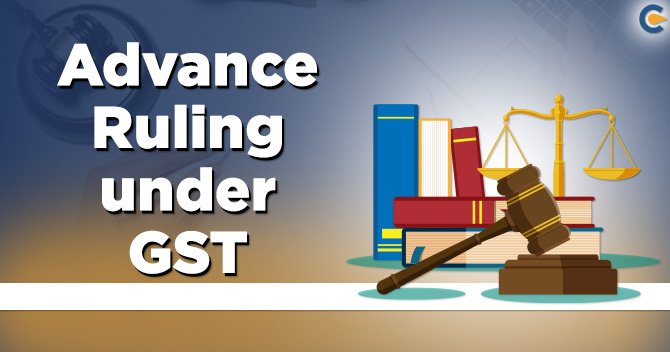Business
Advance Ruling for GST filing and its Importance
Navigating the difficult terrain of Goods and Services Tax (GST) filing necessitates not only experience

Navigating the difficult terrain of Goods and Services Tax (GST) filing necessitates not only experience but also a thorough awareness of the changing tax landscape. The concept of Advance Ruling is a must-have tool in the GST world, providing clarity and predictive insights. According to GST legislation, an Advance Ruling is a written decision issued by tax authorities to an applicant that addresses questions about the supply of goods or services. In this post, we will delve into the complexities of Advance Ruling for GST filing, providing light on its significance and crucial role in empowering experts in the sector.
Individuals seeking proficiency in GST filing will benefit greatly from the GST certification course online, given the ever-changing nature of GST laws. Such courses, such as the Online GST Practitioner Certification Course, not only give in-depth knowledge of the GST structure, but also provide participants with the skills needed to confidently handle complicated tax circumstances. As we investigate the notion of Advance Ruling and its implications for GST filing, the essay intends to highlight the vital role that continual learning, notably through online GST certification courses, plays in improving the competency of tax practitioners and enthusiasts alike.
Understanding Advance Ruling in GST Filing
In the context of GST filing, an advance ruling is a formal opinion or decision issued by the Authority of Advance Rulings (AAR) under GST law. This ruling clarifies or interprets specific questions around the provision of goods or services. An applicant, whether a registered taxpayer or an unregistered individual, may request an early rule to obtain clarification on GST-related issues. The AAR assures that the ruling is issued within 90 days after the application date, and in the event of competing opinions within the Authority, a decision is obtained by majority.
Seeking an advance ruling is an important step for individuals or businesses wishing to understand the GST implications of their activities. The process entails submitting an application to the AAR in the prescribed form and manner, which results in a thorough conclusion that facilitates informed decision-making and GST compliance.
How Advance Ruling in GST Filing Benefits Businesses
Advance Ruling in GST filing plays a crucial role in providing businesses with clarity and certainty in dealing with complex GST-related matters. Here are key ways in which it aids businesses:
1. Certainty in Tax Planning:
- Businesses often engage in complex transactions that may have varied interpretations under the GST framework. Advance Ruling offers certainty, enabling businesses to plan their tax liabilities accurately.
- It helps in avoiding potential disputes and legal challenges, providing a stable foundation for effective tax planning.
2. Risk Mitigation:
- Advance Ruling serves as a risk mitigation tool by eliminating uncertainties related to the interpretation of GST laws. This is particularly beneficial for businesses dealing with intricate transactions or those with international operations.
3. Operational Structuring:
- Businesses can structure their operations in a manner that aligns with GST regulations, ensuring compliance with the tax laws. Advance Ruling provides clarity on the tax implications of specific business activities.
4. Avoidance of Litigation:
- Obtaining an Advance Ruling can significantly reduce the likelihood of legal disputes with tax authorities. This not only saves time and resources but also fosters a more collaborative relationship between taxpayers and authorities.
5. Compliance Confidence:
- With a clear understanding of the tax implications, businesses can navigate the complex GST landscape with confidence. Advance Ruling promotes better compliance practices, contributing to a more transparent and accountable tax environment.
Essentially, Advance Ruling acts as a valuable tool for businesses, offering them a proactive approach to compliance, reducing legal uncertainties, and facilitating smoother GST filing processes.
Procedure for Seeking Advance Ruling
1. Application Filing:
- Taxpayers can file an application for Advance Ruling with the AAR. This application should contain all relevant details and questions related to the interpretation of GST laws.
- The application is examined by the AAR, and if found complete, a hearing is scheduled.
2. Hearing and Decision:
- AAR conducts a hearing where the applicant or their authorized representative presents their case. After considering all relevant facts and legal provisions, the AAR issues a written Advance Ruling.
3. Appeal Process:
- If dissatisfied with the AAR’s decision, the applicant or the tax authorities can appeal to the AAAR. The AAAR conducts a separate hearing and issues a final decision.
Conclusion
In conclusion, Advance Ruling in GST serves as a cornerstone for businesses navigating the complexities of the tax landscape. Its importance lies not only in providing clarity and certainty but also in fostering a tax environment where compliance is proactive rather than reactive. As businesses continue to evolve in the dynamic GST framework, leveraging Advance Ruling becomes essential for strategic tax planning and risk management.
Table of Contents
-

 Business5 months ago
Business5 months agoSepatuindonesia.com | Best Online Store in Indonesia
-

 Technology3 weeks ago
Technology3 weeks agoTop High Paying Affiliate Programs
-

 Tech5 months ago
Tech5 months agoAutomating Your Window Treatments: The Advantages of Auto Blinds
-

 Tech5 months ago
Tech5 months agoUnleash Your Potential: How Mecha Headsets Improve Productivity and Focus
-

 Instagram2 years ago
Instagram2 years agoFree Instagram Follower Without Login
-

 Reviews11 months ago
Reviews11 months agoAndroid Laptop vs. Chromebook: Which one is better?
-

 Instagram2 years ago
Instagram2 years agoIGTOK – Get Instagram Followers, Likes & Comments
-

 Business8 months ago
Business8 months agoFollow These 5 Tips To Avail Personal Loans At Lower Interest Rates




















